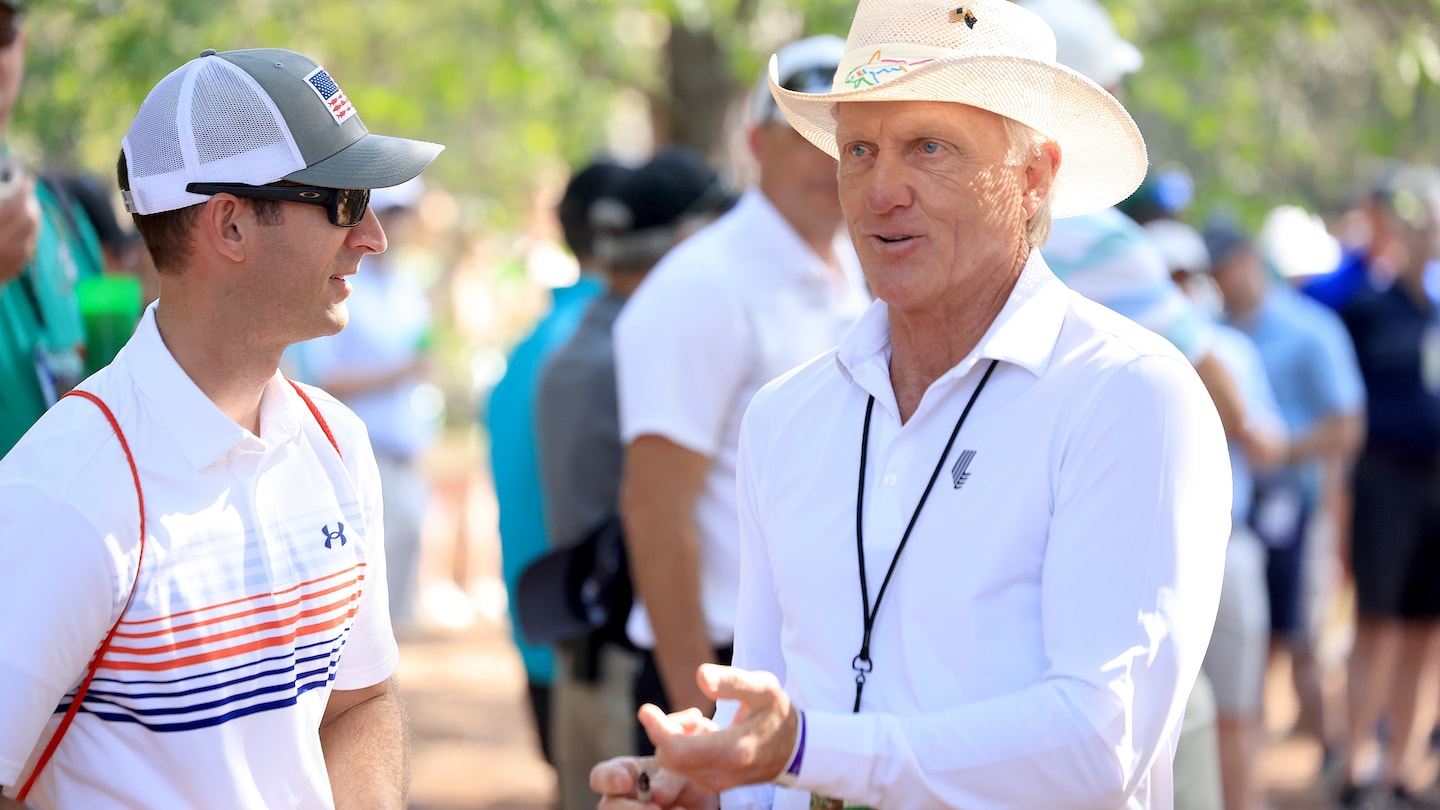AUGUSTA, Ga. — Greg Norman played in the Masters 23 times. He had eight top-five finishes and was the runner-up three times. His play during his 1981 debut here is what inspired his “Great White Shark” nickname. But he had never experienced Augusta National Golf Club as he did Wednesday.
Norman, the LIV Golf chief executive, was like every other ticketed customer during the practice round, jostling among the crowd and walking outside the ropes as he watched players prepare for Thursday’s opening round.
“Walking around here today, there’s not one person who said to me, ‘Why did you do LIV?’ ” he said in a brief interview on the course. “There’s been hundreds of people, even security guys, stopping me, saying, ‘Hey, what you’re doing is fantastic.’ To me, that tells you that what we have and the platform fits within the ecosystem, and it’s good for the game of golf.”
LIV’s presence at the Masters has added intrigue to the storied tournament and stirred questions about the field. Thirteen of the 89 players in this year’s event come from the LIV circuit, a number that would surely be higher if LIV events were recognized by the Official World Golf Ranking. Past champions, such as Phil Mickelson, Jon Rahm and Dustin Johnson, are automatically invited to compete, but several LIV golfers who are enjoying strong seasons had no pathway to Augusta National, including Abraham Ancer, Paul Casey, Louis Oosthuizen and Talor Gooch.
“There’s probably a couple that have been overlooked that should be in,” Norman said. “What is that number? I’m not going to give it a definitive number, but they’re definitely quality players that have done incredible performances over the last six to nine months that are worthy of it.”
Speaking with reporters Wednesday, Fred Ridley, the chairman of the Augusta National, reiterated that LIV Golf didn’t meet standards for recognition from the OWGR but said the Masters would extend “special invitations” to any exceptional LIV players, regardless of their world ranking.
“If we felt that there were a player or players, whether they played on the LIV tour or any other tour, who were deserving of an invitation to the Masters … we would exercise that discretion with regard to special invitations,” he said.
One such invite was extended for this year’s tournament. Joaquín Niemann has slid from No. 15 in the world rankings to No. 93, but he was included in the Masters field, in part because of his success outside the LIV schedule, including a win at the Australian Open in December.
Eighteen LIV golfers qualified for last year’s Masters, and that figure stands to shrink annually, absent OWGR points. Seven LIV players here are past Masters champions, and three others have won another major. Only two LIV players — Tyrrell Hatton and Adrian Meronk — qualified via the world ranking.
“Our goal is to have, to the greatest extent possible, the best field in golf, the best players in the world,” Ridley said. “Having said that, we never have had all the best players in the world because of the structure of our tournament. It’s an invitational. It’s limited field. It’s a small field. … We’re a little bit different situation. But we do have that flexibility, as I mentioned earlier, and I would not foreclose that we would consider that in the future.”
Norman had not been at the Masters since 2021, when he was an analyst for SiriusXM. Ridley made headlines a year ago when he explained that an invitation was withheld from Norman for the 2023 tournament “to keep the focus on the competition.”
This year, Norman didn’t bother waiting for an invitation and came to the course with a pair of LIV executives through the main gate. He wore his familiar white straw hat and a LIV shirt as he walked the course, watching LIV players such as Rahm, Sergio García and Patrick Reed play their practice rounds.
“I’m here because we have 13 players that won 10 Masters between them,” Norman said. “So I’m here just to support them, do the best I can to show them, ‘Hey, you know, the boss is here rooting for you.’ ”
Fans occasionally stopped Norman for photos or to shake his hand, but there were no signs of animosity for the man who launched LIV, revamped the golf landscape and lured many of the game’s biggest names away from the PGA Tour.
Players from both circuits have been calling for some sort of reconciliation that would allow the world’s best players to compete against one another more often, but industry leaders don’t expect the chasm to close any time soon. The PGA Tour continues to negotiate with Saudi Arabia’s Public Investment Fund, which owns LIV, about a potential partnership.
“LIV is completely autonomous to that, to be honest with you,” Norman said of the PIF. “I’m not even privy to any of the conversations, which I’m happy about because we’re focused on delivering what we promised the world we would deliver.”
While detractors predicted LIV players might struggle at last year’s Masters because of the lighter competition schedule, LIV players occupied three of the top six spots on the final leader board, including Brooks Koepka and Mickelson, who tied for second. And last year’s winner, Rahm, joined LIV in December. Norman said he hasn’t heard much from detractors ahead of this year’s tournament.
“I try to strip away all that other stuff, all the white noise and stuff,” he said. “These guys are the best. So when the best get with the best, you’re always going to see the best rise at the top, no matter who or where they play.”
